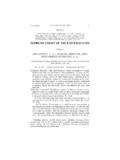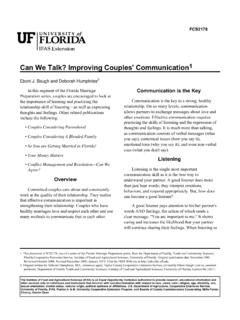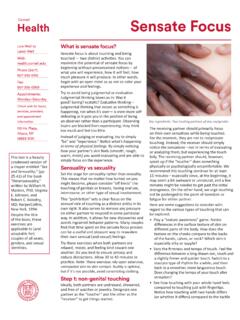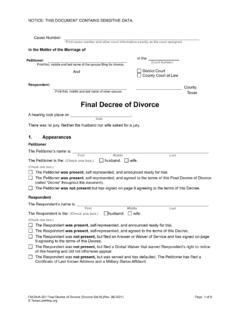Transcription of Marriage (Same Sex Couples) Act: A factsheet
1 1 Marriage (Same Sex couples ) Act: a factsheet Marriage is a hugely important institution in this country. The principles of long-term commitment and responsibility which underpin it bind society together and make it stronger. The Government believes that we should not prevent couples from marrying unless there are very good reasons and loving someone of the same sex is not one of them. The Marriage (Same Sex couples ) Act makes the Marriage of same sex couples lawful in England and Wales, while protecting and promoting religious freedom. The Government believes that opening up Marriage to all couples demonstrates society s respect for all individuals, regardless of their sexuality, making our society fairer and more inclusive for all its members. This change strengthens the vital institution of Marriage and ensures that it remains an essential building block of modern society.
2 The Marriage (Same Sex couples ) Act 2013, was passed on 17 July 2013, and the first marriages of same sex couples took place on Saturday 29 March 2014. Same sex couples who got married abroad under foreign law, who were consequently treated as civil partners in England & Wales, are now recognised as being married in England & Wales. What the Act does: The Act: enables same sex couples to marry in civil ceremonies; ensures those religious organisations which wish to do so can opt in to marry same sex couples according to their rites; protects religious organisations and their representatives from successful legal challenge if they do not wish to marry same sex couples ; enables civil partners to convert their partnership to a Marriage , if they wish; and enables individuals to change their legal gender without having to end their Marriage . The Act also requires reviews to be conducted to consider three issues: whether belief organisations should be able to conduct legally valid Marriage ceremonies; the operation and future of the Civil Partnership Act 2004 in England and Wales; and relevant differences in survivor benefits offered by occupational pension schemes.
3 Religious protections The Act reflects the Government s commitment that no religious organisation or representative will be forced to conduct or participate in same sex Marriage ceremonies. Article 9 of the European Convention on Human Rights guarantees the right to freedom of thought, conscience and religion, and the Act protects and promotes religious freedom through the Government s quadruple lock . This ensures that religious organisations and their representatives can continue to act in accordance with their doctrines and beliefs on this issue. 2 The quadruple lock: Makes clear that a religious Marriage ceremony of a same sex couple will only be possible if: i. the governing body of the religious organisation has opted in by giving explicit consent to marriages of same sex couples ; and ii. the individual minister is willing to conduct the Marriage , and iii.
4 If the ceremony takes place in a place of worship, those premises have been registered for marriages of same sex couples . Explicitly states that no religious organisation can be compelled by any means to opt in to marry same sex couples or to permit this to happen on their premises; and no religious organisation or representative can be compelled by any means to conduct religious ceremonies for same sex couples . Amends the Equality Act 2010 to make clear that it is not unlawful discrimination for a religious organisation or representative to refuse to marry a same sex couple. Ensures that the common law legal duty on the clergy of the Church of England and the Church in Wales to marry parishioners does not extend to same sex couples . It also protects the Church of England s Canon law, which says that Marriage is the union of one man with one woman, so that it does not conflict with civil law.
5 What the change to the law mean in practice Some people have concerns about what equal Marriage means in practice. The nature of Marriage Extending Marriage to same sex couples has not changed the fundamental nature of Marriage , or how it affects opposite sex married couples . Terms such as husband and wife continue to be used, including in legal and official documents. Husband refers to a male Marriage partner and wife refers to a female Marriage partner. Many religious organisations believe that Marriage should only be between a man and a woman, and the Act explicitly recognises this. The civil understanding of Marriage has always been broader than that of many religious organisations. Marriage has evolved over the years, for example to enable Catholics, atheists, Baptists and many others to marry outside the Anglican Church, and to recognise married women as equal to married men before the law.
6 The Church of England and the Church in Wales The Act takes account of the particular circumstances of the Church of England and the Church in Wales. It does not give them preferential treatment. It simply ensures they end up in the same place as every other religious organisation by containing specific measures to deal with their unique legal position. Unlike any other religious 3 organisation in this country, their clergy have a specific legal duty to marry parishioners. In addition, Anglican Canon law forms part of the law of the land. Both the Church of England and the Church in Wales have made it clear that they currently do not wish to conduct same sex Marriage ceremonies according to their rites. The Government respects this position and the Act contains specific measures to ensure that, as for other religious organisations, it is their decision whether to marry same sex couples according to their rites, and there is no compulsion on them to do so.
7 To enable Marriage of same sex couples according to its rites, the Church of England would need to bring forward to the Synod an Amending Canon to amend its Canon law and a Measure to amend the Book of Common Prayer and primary legislation as necessary. Like all Synodical legislation the Measure would be subject to parliamentary approval. Should the Church in Wales decide to allow Marriage of same sex couples , the Act sets out a procedure for its Governing Body to ask the Lord Chancellor to make secondary legislation enabling it to do so. Risk of challenge in the European Court of Human Rights The European Court of Human Rights has made it clear that the European Convention on Human Rights does not impose an obligation on States to grant same sex couples access to Marriage , and Article 9 of the Convention guarantees religious freedom. The Government is confident that the Act provides strong and effective protections regarding religious same sex Marriage ceremonies and ensures that religious organisations and their representatives cannot be compelled to marry same sex couples .
8 This view has been supported by eminent human rights lawyers outside Government. Freedom of expression The Government is committed to freedom of expression and is clear that being able to follow your faith openly is a vital freedom which the Government will protect. The belief that Marriage should only be between a man and a woman is Everyone is entitled to express their view about Marriage of same sex couples at work or elsewhere. A religious or philosophical belief that Marriage should only be between a man and a woman is protected under Article 9 of the European Convention on Human Rights. In addition, discriminating against someone simply because they hold such a belief is unlawful under the Equality Act 2010. Teaching and schools As on any other issue, teachers have the clear right to express their own beliefs, or those of their faith, about Marriage of same sex couples as long as it is done in an appropriate and balanced way.
9 Teachers deal sensitively and professionally with many issues touching on religious tenets in the classroom, such as divorce, and contraception, and there is no reason to think they will do otherwise when teaching about Marriage , now that it has been is extended to same sex couples . 4 Teachers are expected to teach the factual and legal position that Marriage in England and Wales can be between opposite sex couples and same sex couples but they are not expected to promote or endorse views which go against their beliefs. Parents have the right to withdraw their children from sex and relationship education lessons that they do not consider appropriate, as long as they do not form part of the national curriculum programme of study for science (covering the biology of reproduction and the human life cycle). Teachers in faith schools are entitled to express their own beliefs in a balanced way.
10 They are also expected to act according to the tenets of the religion of the school and, as for all teachers, to teach lessons within the context of a school s overall plans, curriculum and schemes of work. Reviews required by the Act Belief organisations conducting marriages During the passage of the Act, strong representations were made that non-religious belief organisations, such as Humanists, should be able to conduct legally valid Marriage ceremonies. The Act therefore requires a review to be conducted to look at whether such marriages should be permitted. The review will include a full public consultation, and a report on the outcome must be published before 1 January 2015. The Act also provides a power to make changes to the law to make marriages according to the usages of belief organisations possible. The future of civil partnerships The Government is reviewing the Civil Partnership Act 2004, and launched a 12-week public consultation on the future of civil partnerships in England and Wales, in January 2014.















